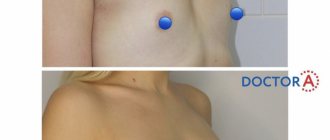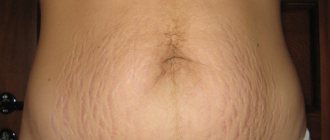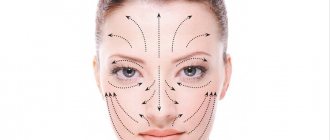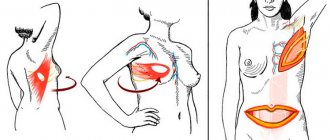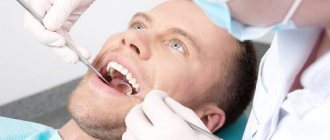During pregnancy and after childbirth, a woman's breasts inevitably undergo changes. In some cases, they are hardly noticeable, and at the end of the breastfeeding period, the breasts return almost to their original shape. But such cases are extremely rare. prolapse (ptosis) and changes in the shape of the mammary glands occur
.
Drooping breasts after childbirth
The degree of ptosis of the mammary glands is determined by several parameters. The main one is the level of the nipples relative to the inframammary fold. If after pregnancy there is no significant drooping, and only the nipples look down (1st degree of ptosis)
, correction can be done using mastopexy (breast lift). For small breast volumes, a lift is combined with augmentation—breast enlargement using implants.
MORE OPTIONS FOR WHAT THE CHEST AND ABDOMEN LOOKS AFTER CHILDREN (click on the photo to enlarge):
photo - lift with implants
MORE PHOTOS JUST SUSPENDERS
MORE PHOTO LIFT + BREAST ENLARGEMENT
Breast implants and the pregnancy process
A number of studies have been conducted in the West about whether silicone can somehow affect the pregnancy process. Thus, there were concerns that silicon (the main substance from which silicone is made) could penetrate the blood and pass the placental barrier, thereby entering the body of the unborn baby. Whether silicone crosses the placenta or not has so far found no significant evidence, however, scientists measured the amount of silicon in the blood of women and came to the conclusion that its level in pregnant women without implants and with implants is almost identical. In other words, scientists have not yet discovered any significant barriers to pregnancy with previously installed implants. That is, implants will not be able to influence the pregnancy process. But the process of pregnancy can significantly affect the result of plastic surgery. The fact is that the breasts undergo perhaps the greatest number of changes during pregnancy, at least visually. The mammary glands enlarge, and as a result, the skin stretches. A woman may experience some discomfort associated with the pressure of the growing gland on the implant. What the breasts will look like after childbirth and breastfeeding is impossible to give an accurate forecast. This happens individually for each person. A common option is excessively stretched skin left after the breasts have returned to their previous shape. The situation can be corrected with breast lift surgery. In this case, there will be no need to replace existing implants.
How to restore breasts after childbirth?
Beautiful breasts have always been considered a necessary component of female attractiveness. After all, a man looks not only at a woman’s face, but also at her shape. It is no coincidence that in the 18th century, during the “golden time” of European royal dynasties, tall people wore defiantly open necklines and a variety of corsets that supported the bust and gave it a magnificent shape.
Pregnancy, childbirth and breastfeeding, which give so much joy, invariably affect the shape of a woman’s breasts. Despite the fact that during this period the powerful restoration mechanisms inherent in nature are activated in the female body, not all women manage to return their breasts to their previous state after finishing feeding the baby. Often the changes are irreversible. We decided to talk about how the shape of the breast changes after childbirth, what physiological processes cause this, and what solutions plastic surgery offers, with a well-known plastic surgeon who has experience in hundreds of operations of various types of breast plastic surgery, Sarvar Kazimovich Bakirkhanov.
Sarvar Kazimovich, as you know, after pregnancy and lactation, the breasts change quite a lot and, unfortunately, not always for the better. Tell me why this happens?
For a woman, the time of pregnancy and breastfeeding is a very touching period. Her hormonal levels change so that all efforts are aimed at creating and caring for the child. Against the background of this hormonal shift, the woman is tuned to positive emotions. This is an external reflection. If we consider internal changes, then using the mammary glands as an example, the following happens.
From the very first days of pregnancy, the volumes of the lobes of the mammary glands begin to increase. On days 7-8 of pregnancy, a woman begins to feel changes in her breasts. In the first 10 weeks there is a rapid hormonal surge. The level of estrogen and progesterone increases. These hormones are responsible for the enlargement of breast tissue and ducts. In addition, a woman’s appetite increases (delivery of nutrients), and the venous network improves - blood flow for the delivery of substances.
And as soon as the child is born (the placenta is separated), another hormone comes into effect - prolactin. It initiates milk production in the mammary glands.
During pregnancy, especially in the first months, there is a sharp increase in breast volume. The skin does not have time to adapt to such a rapid change. Depending on hereditary factors, age, and the condition of connective tissues, skin stretching occurs. Often during pregnancy, irremovable stretch marks form on the breasts. Hormones play a role here, namely the adrenal hormone cortisone. It reduces the production of collagen and elastin, which are responsible for the elasticity of connective tissue. This “cortisol burst” is designed by physiology so that the skin can stretch following the rapid increase in the volume of breast tissue. Collagen and elastin, by their function, restore tissue and are responsible for scarring. Therefore, during the enlargement of the glands, their production decreases so that the skin stretches better.
It's clear. And if we consider it step by step, do breasts increase during pregnancy and lactation, and after the end of the lactation period they decrease?
During pregnancy, breast volume increases due to several factors. The volume of glandular tissue increases, there is a general weight gain (the supply of nutrients for the child), including an increase in the fat layer of the breast. The ligamentous apparatus also adapts to these processes: the ligaments between the lobes of the mammary glands are stretched.
After the end of the lactation period, only the volume of glandular tissue decreases to its original size. Sometimes, with a strong weight loss, part of the adipose tissue also disappears, but the stretched skin, ligaments, and muscle fascia do not return to their original volume.
And how soon do these metamorphoses occur in the breasts after the end of lactation?
Approximately 6-8 months after the end of the feeding period. The timing is very individual, because this greatly depends on how the reverse hormonal changes occur after pregnancy. A year later, we already have a reliable final picture from which we can draw conclusions and choose correction methods.
Tell me, how can I prevent negative changes in breast shape during pregnancy? Are there any preventive measures?
Yes, modern women are paying more and more attention to preparing for pregnancy and childbirth. Now they make special underwear for pregnant women that supports the bust, with wide straps. In addition, there are special creams that can be rubbed into the skin so that it better adapts to the increasing volume of internal tissues. It is useful to take a contrast shower, do a light massage, warm wraps and other procedures that improve blood circulation. All this is explained in childbirth preparation courses.
Does it happen that after childbirth, breasts only get better: bigger, fuller, or is this a fairy tale that you so want to believe?
In fact, the size of the mammary glands at the end of the lactation period becomes the same as it was initially. Due to this factor, no increase can occur. Breasts may remain larger than they were before pregnancy if the woman has not returned to her previous weight, i.e. due to additional fatty tissue that formed in the chest area and did not completely disappear. If a woman has lost weight to her original shape, then the fat layer on her chest also disappears and the volume of internal tissues becomes the same, but stretched ligaments and muscles can no longer return to their original sizes. As a result, the breasts sag.
What operations do women most often undergo after childbirth? Are there any statistics?
First, we find out how a woman herself sees her desired breasts. If she says that she wants small but higher breasts, we perform mastopexy (skin tightening) if she has the required amount of her own tissue, or with small-volume implants. If the patient says that she wants large breasts, then this can be ideally solved with the help of endoprosthetics, without resorting to mastopexy.
According to your observations, what problems and wishes do women most often come with?
Previously, a large number of women came with such changes when mastopexy was indicated. And in recent years, there has been a positive trend: women are preparing for pregnancy. They know and follow the rules for wearing corrective underwear, use special creams, etc. In general, women increasingly protect their breasts from ptosis already during pregnancy.
In other words, there are fewer and fewer women who need mastopexy and can get by with implants? Is mastopexy such a complicated operation?
The point is not the complexity of the operation, but the fact that after mastopexy there is a scar from the nipple down to the submammary fold. And when implants are installed, there are practically no scars left. There are various ways to reduce scars and tattoo, but it is impossible to make them completely invisible.
Then tell us in more detail - what kind of scars remain after operations such as breast augmentation, lifting, and breast reduction?
Our main techniques for prosthetics are the peripapillary and axillary approaches. Accordingly, the scar during endoprosthetics remains in the armpit or around the areola (nipple). However, over time, the scar becomes so invisible that it is difficult to distinguish. With mastopexy, the incision is made circularly around the nipple and from the nipple down to the inframammary fold. The largest scar remains after reduction plastic surgery (breast reduction) - an “anchor incision” is made from the nipple down and in the fold under the breast. But at the same time, the scar and fold are usually visually hidden.
I would like to know about mastitis. For example, such a situation, mastitis occurred during pregnancy or lactation, surgical treatment was performed, which led to asymmetry. Is it possible in this case to restore the beauty of the breasts with minimal scars? How soon after such operations can reconstructive aesthetic breast surgery be performed?
Major surgery is resorted to only in the case of purulent mastitis. Nowadays this is a very rare occurrence. Mastitis is usually noticeable in the early stages and can be treated with antibiotics. But, if the operation did take place and asymmetry of the mammary glands occurred, you must wait until the end of the lactation period and complete recovery (6 months after the operation and the end of the lactation period) and perform an operation to restore aesthetic forms. However, with surgical treatment of mastitis, a very small percentage of patients experience subsequent asymmetry. Only in cases of extensive mastitis. Women come to our clinic with complaints of asymmetry of the mammary glands, but, as a rule, these are congenital features.
Fine. Are there any other operations performed along with breast surgery? For example, liposuction, vaginal reconstruction? Is it safe to combine such operations?
Yes, today this is a kind of “trend” in aesthetic medicine. We also offer patients to solve several problems in one anesthesia. In our practice, we most often combine postpartum pelvic rehabilitation with breast surgery (reduction of vaginal volume, restoration of the pelvic organs, fight against urinary incontinence). The second most popular combination of operations is lower eyelid plastic surgery. After childbirth, problems with the lower eyelids often appear. And in third place are abdominoplasty and liposuction.
For the patient, this tactic is more preferable and favorable, because All operations can be performed under one anesthesia and, accordingly, during one recovery period.
Doctor, what would you recommend to women who have already given birth, fed a baby and are dissatisfied with the appearance of their current breasts?
My recommendations are as follows. During pregnancy, from the very first days, you need to start taking care of yourself, wearing supportive underwear, using various cosmetics, contrast showers, massage, etc. All this is described many times in manuals for pregnant women. In the future, this will avoid or significantly reduce ptosis (prolapse) of not only the mammary glands.
If changes have already occurred and the woman is thinking of undergoing surgical correction, she needs to wait 6-8 months after the end of the lactation period, when all internal processes in the body and in particular in the mammary glands return to normal. Then you can visit a plastic surgery clinic and a specialist will look at how the acquired changes can be corrected.
Today, aesthetic medicine has reached a level where, with minimal effort, you can not only return the original forms, but make them even better!
Thank you Sarvar Kazimovich for such an informative conversation.
I think we were able to answer in detail all the most important questions of our young mothers. Consultation with a plastic surgeon at the Mont Blanc clinic is free! Make an appointment by phone. Waiting for you!
Breast implants and fertility
The process of conceiving a child, in which the fertility of the expectant mother plays a vital role, cannot be disrupted due to the installation of implants. To date, silicone implants have not been found to have any mechanisms that could have any effect on a woman’s reproductive function. In some cases, before undergoing augmentation mammoplasty, women lose excess weight. This helps to achieve a more perfect and aesthetically attractive result after plastic surgery. However, a woman’s health and her ability to conceive may depend on weight loss methods. Aggressive weight loss methods can have a very hard impact on your hormonal levels. However, the process of installing implants, as well as the silicone prostheses themselves, will not play any role in this.
Svetlana Loboda
“Til or not Til is a new dad?” Svetlana’s loyal fans were tormented by the question when she gave birth to a daughter in 2018. It was only Loboda’s first appearance that forced them to temporarily abandon the exciting topic. Leaving the newborn baby with her mother and a supply of breast milk, the singer flew to the music award to present the hit “SuperSTAR”. The premiere went well - as did the “premiere” of the blonde’s new figure. Looking at Svetlana's chest in a tight black dress, no one could argue that she is a superstar.
Breast implants and the lactation process
How the implants were installed may determine whether the woman will breastfeed the child in the future or not, as well as what the lactation process will be like - whether milk production will be sufficient or not. Before performing augmentation mammoplasty, the surgeon will certainly find out from the patient whether she intends to have children in the future. Based on this, a surgical technique will be chosen, the task of which will be to maximize the preservation of milk currents and nerve endings connecting the nipple areola to the mammary gland. As a rule, submammary access in the crease under the breast is considered optimal for this.
Lactation is a process that can be influenced by a variety of factors - genetics, the volume of the mammary glands, concomitant diseases, the tactics of the plastic surgeon if an implant was installed. If milk flows have been disrupted, it is quite possible that milk production will be reduced. Therefore, it is important to choose the most gentle incision option, and in addition, it is important that pregnancy does not immediately follow plastic surgery. After mammoplasty, it is advisable that at least a couple of years pass before the woman becomes pregnant. This time is necessary so that damaged nerve connections and milky currents have time to recover.
As for how a silicone implant affects the quality of mother's milk, so far scientists do not have any reason to believe that silicone has a negative effect on the composition of milk. According to a number of studies, the amount of silicon in mother's milk in women with implants is practically no different from milk in women without implants.
Woman's emotional state
During the period of gestation and birth, the condition of the body and breasts also depends on the emotional state of the woman. It is forbidden to triple the “self-flagellation” regarding weight gain during pregnancy. A young mother should understand that for 9 months her body carried a person, due to this, the period of restoration of her figure may take some time.
In order for playing sports and working on yourself to bring success, it is important to enjoy the process. Upbeat music and a creative approach will help with this. You can do the exercises outdoors with your baby. You should not set goals that will take a long time to achieve. Small short-term victories stimulate new challenges and overcoming them. You need to train your body three times a week, avoiding overwork and excessive stress.
When is the best time to have breast augmentation surgery?
Undoubtedly, the best time to install implants is after the birth of children. There is no risk of losing the result of the operation after the birth of the baby. And there is also no risk of disruption of milk flows. However, modern plastic surgery techniques allow women to breastfeed freely while still having breast implants. If pregnancy is planned in the next year or two, then it is better to postpone the operation and do it after childbirth and breastfeeding. In addition, it will be possible to eliminate at the same time the shortcomings that appeared after childbirth. If a woman does not plan to become pregnant in the next 3-5 years, then you can safely start discussing the operation with your plastic surgeon.
You can learn more about plastic surgery on the breast from the section “Breast plastic surgery”.
Irena Ponaroshku
Irena loved to laugh at her own modest bust, jokingly telling Internet fans that her “cup was half empty,” and calling herself the head of the “no breasts, no problems” club. There was one less reason for self-irony: in October 2018, Irena gave birth to her second child and during breastfeeding she became the owner of a confident “C”. “I have two news. And both are good,” Ponaroshku is now having fun, signing a photo with impressive breasts.
Irena Ponaroshku before and after childbirth. Photo: instagram.com/irenaponaroshku
Masks
Self-prepared or purchased cosmetic masks will not make your breasts firm, but they will help you get rid of stretch marks or other skin defects and stop the appearance of wrinkles.
Using them in combination with exercises and massage will help restore your bust to an attractive and aesthetic appearance, without spending a lot of personal time and financial investments.
Exercises
The procedure for breast reconstruction in the postpartum period includes a set of exercises for the upper body; they must be performed regularly, devoting sufficient time to these activities:
- exercises with dumbbells, which can be replaced with water bottles or other identical loads;
- bench press on a support, for this you can use a chair or table, and the supporting surface must be stable;
- raising your arms from a lying position, placing them behind your head, while it is important not to bend your elbows.
Exercises for raising arms in a standing position with a rotation of the torso are excellent; this gymnastics makes it possible to train several muscle groups, strengthening and increasing their elasticity.

